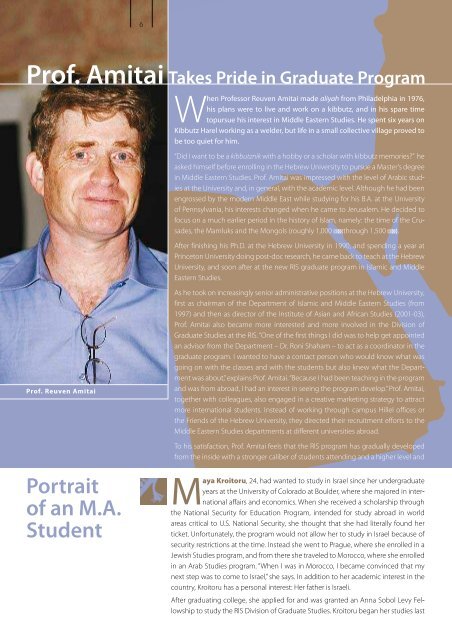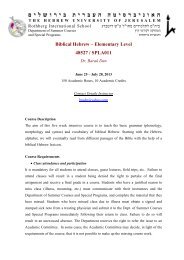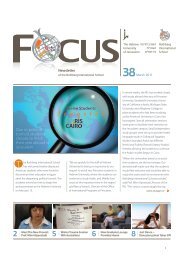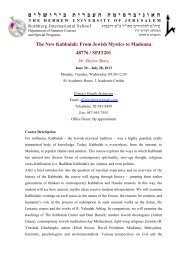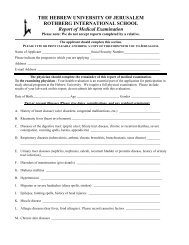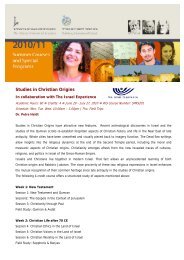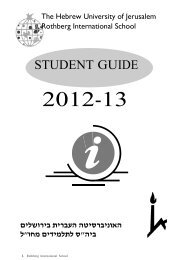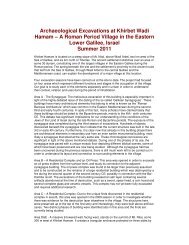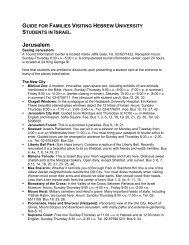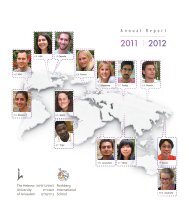You also want an ePaper? Increase the reach of your titles
YUMPU automatically turns print PDFs into web optimized ePapers that Google loves.
6<br />
FOCUS 32 7<br />
Prof. Amitai Takes Pride in Graduate Program<br />
Prof. Reuven Amitai<br />
Portrait<br />
of an M.A.<br />
Student<br />
When Professor Reuven Amitai made aliyah from Philadelphia in 1976,<br />
his plans were to live and work on a kibbutz, and in his spare time<br />
topursue his interest in Middle Eastern Studies. He spent six years on<br />
Kibbutz Harel working as a welder, but life in a small collective village proved to<br />
be too quiet for him.<br />
“Did I want to be a kibbutznik with a hobby or a scholar with kibbutz memories?” he<br />
asked himself before enrolling in the Hebrew University to pursue a Master's degree<br />
in Middle Eastern Studies. Prof. Amitai was impressed with the level of Arabic studip<br />
ies at the University and, in general, with the academic level. Although he had been<br />
engrossed by the modern Middle East while studying for his B.A. at the University<br />
of Pennsylvania, his interests changed when he came to Jerusalem. He decided to<br />
focus on a much earlier period in the history of Islam, namely: the time of the Crusp<br />
sades, the Mamluks and the Mongols (roughly 1,000 c.e.through 1,500 c.e.).<br />
After finishing his Ph.D. at the Hebrew University in 1990, and spending a year at<br />
Princeton University doing post-doc research, he came back to teach at the Hebrew<br />
University, and soon after at the new RIS graduate program in Islamic and Middle<br />
Eastern Studies.<br />
As he took on increasingly senior administrative positions at the Hebrew University,<br />
first as chairman of the Department of Islamic and Middle Eastern Studies (from<br />
1997) and then as director of the Institute of Asian and African Studies (2001-03),<br />
Prof. Amitai also became more interested and more involved in the Division of<br />
Graduate Studies at the RIS. “One of the first things I did was to help get appointed<br />
an advisor from the Department – Dr. Roni Shaham – to act as a coordinator in the<br />
graduate program. I wanted to have a contact person who would know what was<br />
going on with the classes and with the students but also knew what the Departmp<br />
ment was about,” explains Prof. Amitai. “Because I had been teaching in the program<br />
and was from abroad, I had an interest in seeing the program develop.” Prof. Amitai,<br />
together with colleagues, also engaged in a creative marketing strategy to attract<br />
more international students. Instead of working through campus Hillel offices or<br />
the Friends of the Hebrew University, they directed their recruitment efforts to the<br />
Middle Eastern Studies departments at different universities abroad.<br />
To his satisfaction, Prof. Amitai feels that the RIS program has gradually developed<br />
from the inside with a stronger caliber of students attending and a higher level and<br />
Maya Kroitoru, 24, had wanted to study in Israel since her undergraduate<br />
years at the University of Colorado at Boulder, where she majored in internp<br />
national affairs and economics. When she received a scholarship through<br />
the National Security for Education Program, intended for study abroad in world<br />
areas critical to U.S. National Security, she thought that she had literally found her<br />
ticket. Unfortunately, the program would not allow her to study in Israel because of<br />
security restrictions at the time. Instead she went to Prague, where she enrolled in a<br />
Jewish Studies program, and from there she traveled to Morocco, where she enrolled<br />
in an Arab Studies program. “When I was in Morocco, I became convinced that my<br />
next step was to come to Israel,” she says. In addition to her academic interest in the<br />
country, Kroitoru has a personal interest: Her father is Israeli.<br />
After graduating college, she applied for and was granted an Anna Sobol Levy Fellp<br />
lowship to study the RIS Division of Graduate Studies. Kroitoru began her studies last<br />
wider variety of classes being taught. “The internal dynamic in the program has<br />
improved. We are attracting students with a proper background in Middle Eastern<br />
Studies,” he maintains. “This year we have 40 applicants. I understand that it is the<br />
most popular program in the Division.” In addition to the quality of the teachers,<br />
Prof. Amitai is certain that the location is a draw for students. “Jerusalem has a very<br />
good reputation for providing a world class university (certainly in Middle Eastern<br />
Studies) that physically neighbors the Arab world. As students take classes in the<br />
Middle East, they can hear the muezzin calling Muslims to prayer. The program has<br />
definitely become a flagship for the <strong>School</strong>,” he says.<br />
Prof. Amitai enjoys teaching at the RIS. “The students are interested in scholarship.<br />
They generally do the reading – and in my class,” he admits, “there is a lot of reading!<br />
It is a lively crowd and discussions are on a high level.” Prof. Amitai promotes the<br />
involvement of RIS students in his Department’s activities, encouraging those with<br />
a good command of Hebrew to attend lectures or seminars. He would like to see<br />
more graduates of the <strong>School</strong>’s M.A. program continuing to pursue a doctorate at<br />
the Hebrew University.<br />
Recently, Prof. Amitai was appointed director of the Nehemia Levtzion Center for<br />
Islamic Studies, which opened less than two years ago. The goal of the Center is to<br />
encourage research and public activity, related to Islamic studies. “We have great<br />
departments at the University [e.g. Islamic and Middle Eastern Studies and Arabic<br />
Language and Literature], but this is going beyond teaching,” he says.<br />
Activities have included a one- day conference with Yad Ben Zvi on the formation<br />
of Islamic society in the Land of Israel, a conference in conjunction with Mishkenot<br />
Sha’ananim on contemporary Islam, an ongoing discussion group about religious<br />
experience in its social context, and a new lecture series in conjunction with the<br />
Forum for European Studies on Islam in Europe.<br />
“In general, we try not to be either polemical or apologetic at the Center,” explains<br />
Prof. Amitai. “I believe there needs to be dialogue between scholars studying the<br />
pre-modern and modern Middle East and Islam. The modernists sometimes have a<br />
certain lack of regard for scholarship on the 'medieval' period and vice versa, but it is<br />
only while working together that we can present a complete picture of the Muslim<br />
world to the public. Our Center is trying to bridge that gap.”<br />
year, but after four months she realized one year would not be enough to accomp<br />
plish her goal of becoming proficient in both Hebrew and Arabic. She requested to<br />
extend her fellowship for a second year in order to finish her M.A. degree in Islamic<br />
and Middle Eastern Studies. She then plans to return to the U.S. to pursue a career in<br />
international relations, ideally in some sort of analyst position at a research institute in<br />
Washington, D.C. “I decided on this career after reading Thomas Friedman’s The Lexus<br />
and the Olive Tree,” she says. “I am mostly interested in American-Israeli relations and<br />
ethnic conflict .” Given her professional interests, she was very pleased to be one of<br />
the RIS students chosen to meet with U.S. Ambassador to Israel Richard H. Jones (see<br />
page 16). “We held a fairly serious discussion about cross-cultural experiences,” she<br />
says. “He talked to us about his diplomatic career, and he inspired us to get further<br />
involved in policy making and in learning languages.” Thanks to her studies in Israel,<br />
she has mastered the Hebrew language.<br />
”This year we have<br />
40 applicants.<br />
I understand that<br />
Middle Eastern<br />
Studies is the most<br />
Newsletter of the<br />
<strong>Rothberg</strong> <strong>International</strong> <strong>School</strong><br />
popular program in<br />
the Division.”<br />
Maya Kroitoru


